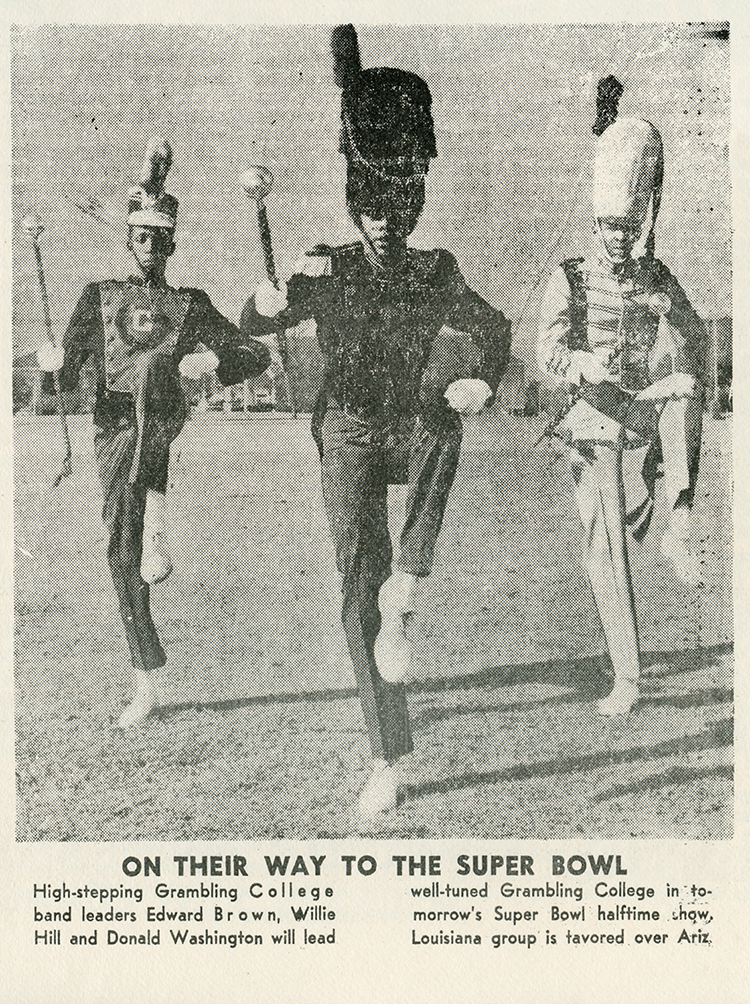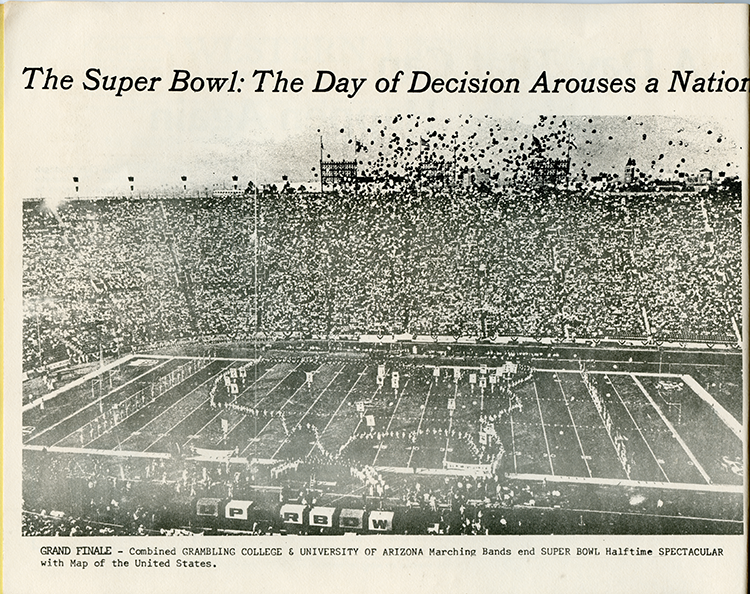Super Bowl I, current marching band members honor historic national performance
Current band members look to continue legacy of musicianship and discipline
by T. Scott Boatright | Office of Communications
 The Super Bowl has been played seven times in the Greater Los Angeles area. The Grambling State University World Famed Tiger Marching Band has been a big part of that LA Super Bowl history after playing in the first halftime show of what was then called the AFL-NFL World Championship Game. The name did not become “Super Bowl” until the third game was played in 1969.
The Super Bowl has been played seven times in the Greater Los Angeles area. The Grambling State University World Famed Tiger Marching Band has been a big part of that LA Super Bowl history after playing in the first halftime show of what was then called the AFL-NFL World Championship Game. The name did not become “Super Bowl” until the third game was played in 1969.
Grambling State’s marching band has participated in a record six Super Bowl halftime shows, ranging from the first two to its last performance in 1998.
But it was the first Super Bowl performance — part of football history — that made “The World Famed” a “gamechanger” in ways that went far beyond the football field.
That first Super Bowl performance came during a time of much racial tension. Riots broke out in cities like Detroit and Los Angeles. The racism-confronting “In the Heat of the Night” won Best Picture at the Academy Awards that year, and Thurgood Marshall was named the first Black Supreme Court Justice.
Amid that atmosphere, the GSU band joined the predominantly white University of Arizona band to change the world.
Duke Ellington Fields of Farmerville, Louisiana, was a sophomore baritone player and said he will never forget that trip to California.
“We got on the plane in Shreveport, and it was raining with a lot of thunder and lighting,” Fields said. “And in the middle of that, I’m taking my first flight. The speed of the plane pushes you back into the seat and then you feel the nose lift. I had never gone through anything like that. It was quite an experience.”
After stopping to refuel in Dallas, the plane lifted back off for a two-hour trip to Los Angeles.
“It was a different world. At that time, it was quite different,” Fields said. “Times weren’t like they are now. (Then GSU President Ralph Waldo Emerson Jones) made sure we watched our Ps and Qs. Before we took the trip, we talked about knowing how to act and conduct ourselves. We were very conscious of doing our best and making Grambling proud.”
And that they did, joining the University of Arizona band on the field to depict a map of the United States while playing “America the Beautiful” as well as doing a jazzed-up rendition of Eddie Lee Floyd’s “Knock on Wood.”
Willie Hill was the drum major leading the Grambling band on the field that afternoon and realized they truly were playing the role of “gamechanger” even during the civil rights movement.
“We collaborated with other black bands all the time,” Hill, who in 2019 retired from his job as Director of the Fine Arts Center at the University of Massachusetts Amherst, told ESPN in 2004. “But here’s an all-white band from Arizona. It was a different twist to what we were accustomed to. We had to make sure we were hot stuff.”
 Grambling State’s band members were already veterans at big-time performances, so the pressure of the moment was not hard for them to handle.
Grambling State’s band members were already veterans at big-time performances, so the pressure of the moment was not hard for them to handle.
“We had already played pro games before — we were used to that,” Fields said. “It was just another show for us. Most people think, wow, they played the first Super Bowl. But that really didn’t have any meaning at the time because it had never happened before. That was the first one, so it didn’t have any kind of effect on us. We always did what we had to do, so we did. Do a top rate show, that’s it. We were like conquerors. We win. That’s what we do.”
Freddie Colton of Baltimore was on the field playing the cymbals for Grambling during the show and said the enormity of what the band was participating in was not realized until much later.
“It did not come full circle to us until many, many years later,” the 74-year-old told Washington DC’s WTOP news earlier this week. “The gravity of us: a Black band from Louisiana during the integration-segregation time, flying on a plane, staying in a five-star hotel, eating very, very good food, and performing in front of millions in America.”
The Super Bowl halftime show has become almost bigger than the game itself over the years. Acts like Michael Jackson, The Rolling Stones, Prince, and Lady Gaga have all taken the spotlights over the years.
Dr. Dre, Mary J. Blige, Snoop Dogg, Kendrick Lamar, and Eminem are set to share this year’s stage on Sunday.
And all of the hoopla and spectacle began 55 years ago with a trailblazing band from a small town, north Louisiana HBCU.
“This was really something that cemented our legacy within not just the history of the NFL, but American history to have an African American marching band performing many of those tunes that folks were used to hearing on the radio. Most people, certainly not in California, were accustomed to having HBCU bands,” GSU President Rick Gallot, a former member of the World Famed Tiger Marching Band, said in a video released by the NFL earlier this week. “These are actually really good performers who are doing an incredible job on what certainly is now viewed as one of the largest stages in the world.”
“To be able to do it at that particular time, and coming from the Deep South where segregation was still much alive and well, and to inspire generations of individuals to know that if this band can do it, what is it that we can’t do?”
Current GSU band students are proud of the legacy left to them by the World Famed alumni who were on the field at the Los Angeles Coliseum for the first Super Bowl game.
“It feels great to be a part of a long-lasting legacy like the Grambling band because everything that they did back then still positively affects us to this day,” Sheavion Jones said. “It is an honor and a privilege to do the things we do in the band and these types of experiences will carry us for the rest of our lives.”
“I think it is an extreme honor to be a part of this wonderful legacy,” said Rodney Terrell, another current band member. “Most people go through life hoping to be a part of something great. Being a part of this band not only does that but also gives us an opportunity to keep that legacy going. How can we outdo ourselves when we have already done so much amazing work? Yet we still find ways to do it and make those that came before us proud.”
Two GSU drum majors who follow in Hill’s footsteps 40 years later feel much like Jones and Terrell.
“Being able to continue to add more historical events to the World Famed and for Grambling as well [gives us pride],” said Candance Harthorne. “Being the first female drum major in 70 years has made my legacy reach many black girls and inspire them to expand their goals and meet them in every way they can. A legacy cannot be just that without hard work and dedication. In every performance, the World Famed strive for perfection and multiply the excellence of Grambling’s legacy.”
Fellow current GSU head drum major Deante’ Gibson echoed Hawthorne’s sentiments.
“It is a huge privilege to be a part of the World Famed Tiger Marching Band,” Gibson said. “Not only is this the band’s legacy, but it’s also about upholding what the former bandsmen of the Grambling College Band created. Being able to grow from being a freshman and learning a lot of skills and unique talents is a blessing. While holding the status of head drum major, this is a complete honor to see and uphold the program to the standards of the band from the first Super Bowl.”

